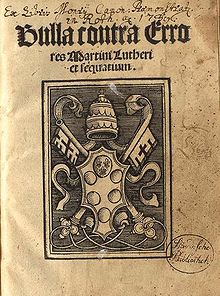Exsurge Domine
Exsurge Domine (Latin: "Rise up, Lord") is the name of the papal bull threatening ban , which was passed by Pope Leo X on June 15, 1520 in response to Martin Luther's 95 theses .
Contents of the bull
The bull is named after the opening words, the Ps 73.22 VUL has been taken. It begins with an invocation of God against the wild animals that inhabit the Lord's vineyard, i.e. H. the church, destroy. Without naming names, it goes on to say that errors had arisen in Germany that were “partly already condemned earlier, partly heretical, false, angry, offensive to pious ears or seductive to simple minds”.
The bull then lists 41 sentences, with the exception of a corresponding rendering, these are literal quotations from Luther's writings. Arguments for their rejection are not given. The arrangement is not strictly systematic, but the following thematic blocks can be identified:
- Sacrament of penance ,
- Eucharist and lay chalice ,
- Church treasure, indulgences and spells,
- The Pope's key and teaching power, councils,
- Good works
- Heretic cremation
- Turkish war
- Free will
- purgatory
- Begging.
Whether all of Luther's sentences were heretical or just sounded offensive, in the opinion of the authors , remained in the balance. But all the cited sentences were condemned, that is, no one was allowed to affirm or represent them. Luther's writings containing them were not allowed to be read, owned or kept; they should be burned.
Luther was asked to renounce his mistakes within 60 days and to send a revocation to Rome, or to come to Rome himself (for which he was promised safe conduct) and to revoke them there. If Luther does not withdraw, those of his writings that do not contain any of the listed sentences will be confiscated and burned.
After the deadline, anyone was forbidden to interact with Luther. He was to be arrested and extradited to Rome. A place where he stayed for three days should fall under the interdict .
Luther's reaction
Luther responded with the work "Von der Freyheith eines Christenmenschen", which was written at the suggestion of Karl von Miltitz and addressed to Hermann Mühlpfordt in Zwickau, including a letter to Pope Leo X. from October 1520 (backdated to September 1520). In this, Luther defends the freedom of God's word:
"Beyond that, I cannot tolerate rule or measure to interpret the Scriptures, while the Word of God, which teaches all freedom, should not nor must be imprisoned."
On December 10, 1520, after the withdrawal period had expired, Luther publicly burned his copy of the bull - in response to the burning of his own works by representatives of the Church. The Vatican responded consistently with the final excommunication by the bull of excommunication Decet Romanum Pontificem of January 3, 1521.
In the Saxon Central State Archive in Dresden an original of the bull is obtained that in 2004 in the Saxon State Exhibition - "Faith and Power Europe in the age of the Reformation" in Hartenfels Castle was shown in Torgau; There is also a copy in the Vatican archives.
Text output
- Main State Archive Dresden, 10001 Older documents, HStAD, 10001, No. 10277, rv ( digital copy )
literature
- Martin Brecht : Martin Luther . Volume 1: His Path to the Reformation 1483–1521. 2nd edition, Calwer Verlag, Stuttgart 1983, ISBN 3-7668-0678-5 , pp. 371-378.
Web links
- Excerpts (German) from the bull threatening ban EFG Berlin Hohenstaufenstrasse
- The bull "EXSURGE DOMINE" Leo X with the threat of excommunication to Martin Luther. ( Memento of September 25, 2006 in the Internet Archive ) Vatican Apostolic Archives , Historical Documents. (With an illustration of an original page)
- Ban threat bull - Text in Latin EFG Berlin Hohenstaufenstrasse
